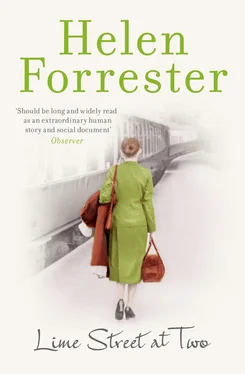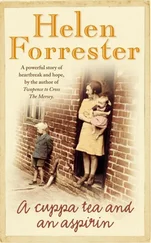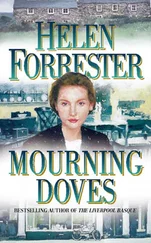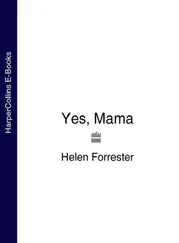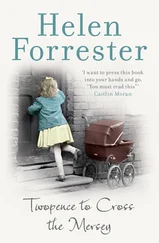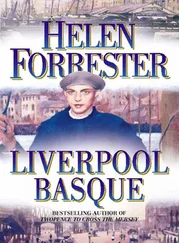Being able to talk frankly to Mrs Hicks during several visits helped me immeasurably. She encouraged me to cry and talk as much as I wanted, and she never used the platitudes that come so readily to the lips of those trying to comfort the bereaved. Illiterate she might be, but she understood people very well, and I began to accept that I really had to pick up my life again and go on living.
Everyone in Liverpool needed as much strength as they could muster. That autumn, we endured over fifty consecutive nights of air raids. Brian, Tony, Avril and little Edward looked washed out and old, because of fear and lack of sleep. They never complained, however, and the three younger ones went to school daily, no matter how late they had had to sit up. Fiona was rarely at home during these raids; she continued her social life as if the bombings never occurred. She would return home after the raid was over, with stories of playing cards in hotel shelters or eating in a restaurant while the lights dipped from time to time, as the building rocked.
We worried when Brian was on duty during a raid. The more intense the attack, the more likely that telephone wires would be brought down, and the more messages he would have to carry through the pandemonium of the streets. A cyclist has not even the protection of a vehicle roof over his head; and, for once, Mother and I were united in our worries. He would turn up, however, soon after the all clear had sounded, covered with dust, eyes bloodshot, triumphant and cheerful, after having helped the police and wardens dig out victims.
After one particularly heavy raid, he breezed in rather later than usual, saying casually to our horrified mother, ‘Sorry I’m late. We had to find the heads.’
Without the production of the head of a victim, a person could not immediately be pronounced dead – arms, legs, even torsos, did not count, and this caused boundless difficulties to many families. So, quite phlegmatically, seventeen-year-old Brian had been hunting heads at the site of a bad incident.
I wondered if the highly strung, imaginative little boy had really grown into an iron-nerved man, or whether he had just learned, of a necessity, to live with his fears. In any case, his experience as a police messenger must have helped to prepare him for the greater horrors he saw later in the Royal Navy. He never lost his compassion, though; the small boy who took pity on a whining puppy and brought it home grew into an immensely understanding man.
Sometimes I was myself caught in a raid, while still at the office or when walking home; once or twice, when the siren sounded, I was at a dance with my friend, Sylvia Poole.
I had known Sylvia for a number of years. She had a lively mind and we enjoyed discussing topics of the day. I was interested in the forces that shaped history, and in individuals, like Churchill and Hitler, who seemed to be born at a pivotal moment in time. Did they shape our history or had our history shaped them? Ideas about the economic forces surging beneath the surface of the news turned my attention to appropriate books and newspapers, as did the plight of European Jews.
I knew more than most people about the dreadful situation of European Jews, because since 1933 I had seen a steady stream of refugees go through our office, and each of them had his own shocking story. When I put the individual stories together and saw the general trend of them, I was both horrified and terrified.
After the war, when I talked to demobilised friends who had served in the army of occupation in Germany, men and women who had seen Belsen and other death camps, I knew that even my worst imaginings had under-estimated what had happened. I had been taught that the Germans were the best educated, most advanced people in Europe; yet they had condoned genocide.
Sylvia and I never discussed our personal affairs. Looking back, I do not really know why not. Girls are supposed to giggle and confide in each other. I never did. Sylvia was precious to me because of the way we hammered out ideas.
Sometimes, during that hard winter of 1940–41, I accepted a date with the acquaintance of Harry’s who had escorted me home on the day that the Dance Club closed. I was glad of company, and had no thought of anything more than that; indeed, I found it hard to think beyond the day I was living. He was a pleasant, shy young man in a reserved occupation, but when he wished to deepen the friendship and began to speak of a possible engagement, I sent him on his way. Though I liked him, I could not love him.
There was an inner core of me which was extremely fastidious. Though I was a passionate young woman, I lived in a time when many girls would not settle for less than marriage; and for me marriage had to have real love as one of the ingredients.
As a good dancer, I had the opportunity of meeting throughout the war a great number of young men. Far from the roots of home, men who normally would not have been seen dead in a ballroom, sought company on the dance floor. Friendships and romances flourished, but for me the chemistry was never right. And I further longed to meet the kind of cultivated man who visited our home in the long-ago days before Father went bankrupt. Though Harry had fought his way up from nothing, he had had the company of scholarly men during his youth; he knew how to study and he read widely. His mother might be a most unreasonable woman, but I think it must have been she who taught him good manners, and this, added to a naturally kindly character, made him a very pleasant person to be with.
On 28th October, the Empress of Britain was sunk, and on 5th November, the armed merchant cruiser HMS Jervis went down while escorting an Atlantic convoy. Despite brave efforts by the Jervis to defend the convoy, five other boats joined her at the bottom. In December, U-boats off the coast of Portugal played havoc with several convoys. The sorrow caused was reflected in our office, the names of ships whispered by weeping women becoming a monotonous litany.
We became expert at guiding womenfolk, many of whom could hardly read or write, through the voluminous red tape in which they became enmeshed when they applied for pensions. Some women took a double blow; they lost a husband or son to the German navy and, during the air raids, they lost their home, and, sometimes children, as well. It became a relief to deal with more ordinary problems, like a cripple’s special needs or a bastardy case.
Increasingly, I sought diversion during the long hours spent seated on the cellar steps, when there was nothing to do except consider how sleepy and how miserable one was. So I continued to study my German grammar book, until the humour of it struck me; then I laughed and put it away – I never wanted to speak to a German again. Crouched on the steps with a lap full of cotton reels and darning wool, I sewed and mended. Whenever I had a few pence, I went with Sylvia to a new dance club or to the theatre, regardless of the heaviness of the raid.
I danced mechanically with anyone who asked me, glad when the man was a good dancer, so that I could give myself over to the rhythm of the music and find some relaxation. While exchanging the usual pleasantries, I would, over my partner’s shoulder watch the door, look at the other men on the floor, always hoping, half believing that Harry would be there. Outside, I searched the faces in the bus queues and in any group of seamen walking in the town; wherever there were men, my eyes hunted automatically. I began to understand Mrs Hicks’ remarks about the need for wakes and funerals, to be convinced of death.
The owner of the new dance club which Sylvia and I attended converted his lessons into a permanent wake. He had lost his wife in the blitz and had had her body cremated; her ashes were put into a fine vase, and the vase was set on a special shelf in the ballroom. The idea was so macabre that we ceased to go there and, in fact, neither of us ever went to a dancing class again.
Читать дальше
